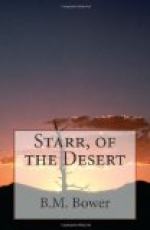Down the hole from the manger Starr slid, and into the arroyo bottom. He stumbled over a can of some sort, but the wind was rattling everything movable, so he merely swore under his breath and went on. He was not a range man for nothing, and he found his way easily to the adobe house with LAS NUEVAS over the door, and the adobe wall with the plank gate that had been closed.
It was closed now, and the house itself was black and silent. Starr stooped and gave a jump, caught the top of the wall with his hooked fingers, went up and straddled the top where it was pitch black against the building. For that matter, it was nearly pitch black whichever way one looked, that night. He sat there for five minutes, listening and straining his eyes into the enclosure. Somewhere a piece of corrugated iron banged against a board. Once he heard a cat meow, away back at the rear of the lot. He waited through a comparative lull, and when the wind whooped again and struck the building with a fresh blast, Starr jumped to the ground within the yard.
He crouched for a minute, a shot-loaded quirt held butt forward in his hand. He did not want to use a gun unless he had to, and the loaded end of a good quirt makes a very efficient substitute for a blackjack. But there was no movement save the wind, so presently he followed the wall of the house down to the corner, stood there listening for awhile and went on, feeling his way rapidly around the entire yard as a blind man feels out a room that is strange to him.
He found the garage, with a door that kept swinging to and fro in the wind, banging shut with a slam and then squealing the hinges as it opened again with the suction. He drew a breath of relief when he came to that door, for he knew that any man who happened to be on guard would have fastened it for the sake of his nerves if for nothing else.
When he was sure that the place was deserted for the night, Starr went back to the garage and went inside. He fastened the door shut behind him and switched on his pocket searchlight to examine the place. If he had expected to see the mysterious black car there he was disappointed, for the garage was empty—which perhaps explained the swinging door, that had been left open in the evening when there was no wind. Small comfort in that for Starr, for it immediately occurred to him that the car would probably return before daylight if it had gone after dark.
He turned his hand slowly, painting the walls with a brush of brilliant light. “Huh!” he grunted under his breath. For there in a far corner were four Silvertown cord tires with the dust of the desert still clinging to the creases of the lined tread. Near-by, where they had been torn off in haste and flung aside, were the paper wrappings of four other tires, supposedly new.
So they—he had no more definite term by which to call them—they had sensed the risk of those unusual tires, and had changed for others of a more commonly-used brand! Starr wondered if some one had seen him looking at tire-tracks, the young Mexican he had met on the side street, perhaps. Or the Mexican garage man may have caught him studying that track by the filling-pump.




